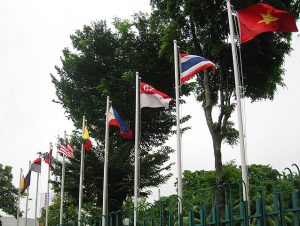Last week, Southeast Asian countries held a series of meetings between themselves as well as partner countries on advancing a regional security hotline. The meetings highlighted the ongoing development of the initiative as part of a wider effort to promote confidence-building measures in the regional security landscape.
As I have noted before in these pages and elsewhere, the Association of Southeast Asian Nations (ASEAN) today has a series of confidence-building measures that are advanced through a range of ASEAN-led security institutions, both within ASEAN meetings as well as “Plus Meetings” that are held with select partner countries.
Among these is the ASEAN Direct Communications Infrastructure (ADI). Initially advanced by Brunei as the Direct Communications Link (DCL), it has since then evolved into the wider ADI, with the initial focus being on facilitating the creation of a hotline for Southeast Asian defense ministers to share information and to communicate in the event of crises, including those in the maritime security domain.
Though the ADI itself had been launched back in 2017, since then, efforts have been made to further institutionalize and expand it further with other partners to help manage security collaboration and enhance regional confidence building measures. A notable step came in July this year, when, during the 13th ASEAN Defense Ministers Meeting (ADMM) in Bangkok, the ASEAN countries finally adopted a concept paper on Expanding ADI to Plus Countries.
Last week, the ADI was in the headlines again with the convening of a series of meetings in Brunei. ASEAN countries themselves held the 5th Ad Hoc Working Group Meeting on ADI, following the fourth iteration of the meeting that occurred in April 2018. According to the official account of the meeting, the countries discussed the state of the ADI, including steps within Phase 1 as well as Phase 2 moving forward.
In addition to that, the ASEAN countries also met with their partners in the Workshop with Plus Countries with respect to the potential expansion of ADI. Per the official account of the meeting by Brunei’s defense ministry (MINDEF), the meeting was aimed at introducing the Plus Countries to ADI as a first step in its expansion, which included a discussion of strategic, operational, and technical aspects. Among the countries that attended included India, Japan, New Zealand, Republic of Korea and the United States.
Unsurprisingly, not much in the way of specifics were publicly disclosed about the private deliberations, particularly since discussions are still ongoing about how to move forward. And despite the incremental progress that ADI has made since it was first proposed, there are still lingering challenges to both implementing it within Southeast Asia as well as expanding it out to the region more broadly. Nonetheless, meetings such as the ones we saw recently will continue to be important to watch to assess the extent of progress made with respect to the ADI as well as its future prospects.

































